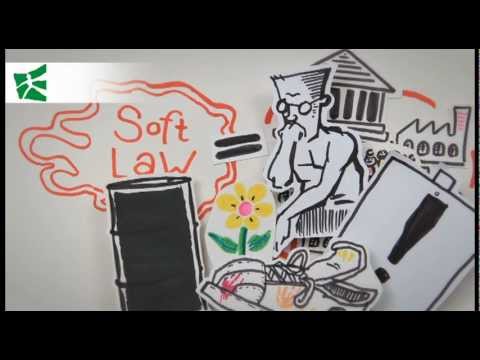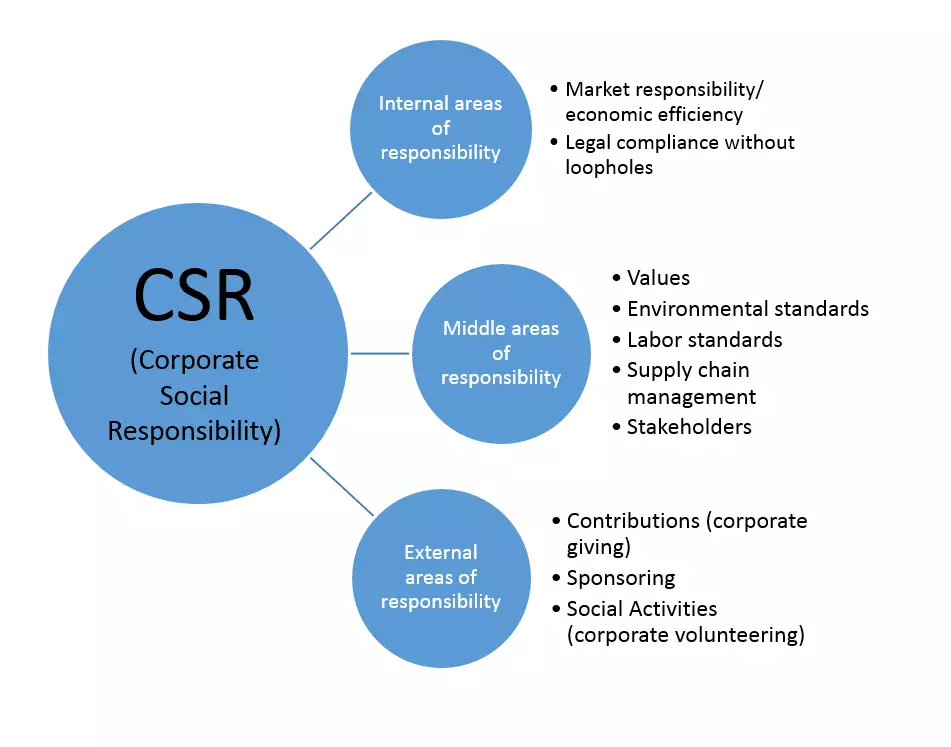What is corporate social responsibility (CSR)?
Corporate social responsibility (CSR for short) is the internationally regarded concept for responsible corporate behavior – although it is not clearly defined. In a nutshell, CSR refers to the moral and ethical obligations of a company with regards to their employees, the environment, their competitors, the economy and a number of other areas of life that its business affects.
CSR is often understood as a voluntary commitment to certain company rules i.e. beyond state laws and standards. This means that companies that operate responsibly and morally can often use their CSR for PR purposes as well. If it becomes known that a company voluntarily commits itself to a good cause, this improves their public image.
For this reason, however, the concept of corporate social responsibility is repeatedly criticized: many companies do not embrace CSR as a result of genuine altruism, but rather to develop their own image. In this article we explain in detail what CSR is, how it has developed, and how CSR is borne out in some companies today.
Corporate social responsibility (CSR) refers to the self-imposed responsibility of companies to society in areas such as the environment, the economy, employee well-being, and competition ethics. Many companies use internal CSR regulation as a form of moral compass to positively influence the ethical development of their business. Positive corporate social responsibility can also offer economic benefits.
Developed and detailed definition of corporate social responsibility
The concept of companies acting responsibly is not new, but through the term “corporate social responsibility” (CSR) it has taken on a modern meaning. Even centuries ago people were occupied with the question of whether the economic activity of a business should be used for good rather than to simply make a profit. In the middle ages there was a concept of the “honest merchant” who would operate according to a code of values and thereby influence other traders to bring benefits to society as a whole by complying with certain rules of conduct.
For bigger companies, corporate responsibility won a greater meaning during industrialization, as firms would build housing for their employees and harsh working conditions prompted a growth of the issue in the collective consciousness. Companies slowly began to accept social responsibility for their employees and their families, although when decisive improvements were made it has only as a result of nationwide implementation and state legislation. An environmental ethic simply did not exist in most companies at that time.
The modern concept of company responsibility as we know it today arose in the 1950s in the US. At that time, many public discussions were being held on the topic and the first scientific findings were being published. Howard R. Bowen in his article “Social Responsibilities of the Businessman” described corporate responsibility as the logical consequence of the social accountability of individuals within the company. Thereby, it would have to orient itself according to these rules and thereafter enforce them. At the time, most companies did not feel obliged to work towards a more moral business focus: the defining outlook was that economic growth remained the determiner of everyday working life.
From the 1970s, socially active institutions that could have a positive influence on the moral outlook of society were increasingly recognized by companies. Society and business were in constant interaction and it was believed that through this there could be a consolidation of social norms within the capitalist economy. Corporate social responsibility existed before the century’s end, although perhaps more so as a hopeful ideal than as a behavior-changing act.
In recent years, with the growing focus on environmentalism and questions of ethics within a globalized world, CSR has begun to take on a stronger meaning. The rising importance of the internet meant that companies who behaved irresponsibly were quickly derided and suffered a serious blow to their public image when operational scandals, abuses, and grievances were publicized on social networks. From this, corporate social responsibility developed from an ideal to an important field of work for many companies.
Corporate social responsibility (CSR) and "corporate citizenship" are also often used synonymously. The confusion of terms shows, on the one hand, that CSR is a broad field and covers many sub-areas, while on the other hand, that the term itself is misleading. This is because "responsibility" implies an externally imposed principle and emphasizes the less voluntary nature of CSR.
These days, large companies cannot afford to not take CSR seriously. Some employ CSR specialists who help to not only formulate the companies’ moral code but also to monitor its implementation. This can often have added economic benefit if the positive corporate social responsibility can be used for marketing and PR use; everyone involved benefits from well-implemented CSR.
Companies are sometimes accused of driving their CSR efforts in the hope of having a positive advertising effect and increasing profits, and not for moral motives. Critics therefore simply equate CSR with marketing. On the other hand, there is also a widespread opinion that the intention behind corporate social responsibility is not so important, as long as it is ultimately benefitting people.
The three core focuses of corporate social responsibility
Corporate social responsibility is a somewhat unclear concept, and consequently there are several ways of understanding the underlying concept. A relatively popular model is the responsibility model mapped out by Stefanie Hiss. She separates CSR into three core areas, which are each named according to the nature of their work:
- The internal area of responsibility encompasses all internal strategies and processes that do not reach the public but which are essential for the ethical orientation of the company.
- The middle area of responsibility includes all of the fields that are publicly effective and have a direct effect on the environment and society, but which are still a normal part of the working process.
- The external area of responsibility is for all activities that require action; for instance, if a company becomes charitably active (mostly financially) and interrupts or adapts its daily work processes.
Internal responsibility
The internal area of responsibility includes all internal processes that affect the corporate strategy itself. The internal area of responsibility is usually the responsibility of company executives and influences important decisions, e.g. which business partners are acquired, one's own responsibility to the market with regard to monopolies, fair and realistic growth planning, and healthy profitability.
In the ideal case, the moral compass of the company plays an important role in decision-making, however, it is usually difficult to judge from the outside to what extent a company takes its internal area of responsibility seriously. CSR management that is visible to the outside world is at least an indication that the internal strategy also takes moral principles into account.
Middle area of responsibility
The middle area of responsibility includes all those actions of a company whose effects on the environment and society can be measured more or less directly. This includes CO2 emissions and air pollution as well as working conditions for employees. This also includes responsible supply chain management, because cooperation with morally questionable companies ultimately supports their corporate policy.
Corporate social responsibility (CSR) in the middle area of responsibility is the most difficult to coordinate for many large corporations, but has gained considerable importance – precisely because it is in this area that the most damage can occur. This applies not only to the environment and society, but also to a company’s own employees, stakeholders, and reputation.
Stakeholders: Stefanie Hiss suggests that the middle area of responsibility mainly refers to stakeholders. Generally speaking, stakeholders are people who have an increased interest in processes, working conditions and, in most cases, the success of the company. The following groups of people form important stakeholders:
Employees
Companies have a duty to their employees to ensure a pleasant working environment and, in addition, to make information sufficiently transparent in terms of career opportunities and hierarchies. This also includes the issue of fair payment and profit sharing as well as the limitation of the term of contracts.
Another fundamental element for healthy CSR in this area is the constructive interaction with trade unions when they operate within the company. In extreme cases, there can be strikes if companies do not take their social responsibility towards their employees seriously. Unacceptable working conditions sometimes even call human rights organizations or state institutions into question. Frequently employees will make these grievances public, meaning that the news can spread like wildfire across social media and cause considerable image damage.
Equity and debt capital providers
Investors have a clear interest not only in the success of the company, but also in fair cooperation. Above all, listed companies are threatened with considerable damage if their dealings with business partners and investors are morally questionable or dishonest.
Clients
Companies that supply products should not deceive their customers. Especially in the case of consumer goods such as food, a company has the responsibility to correctly inform the customer about the preparation and composition of the product. Knowing the origin of the product and the raw materials used is also important to many customers. If a company presents itself to the outside world as environmentally friendly, but uses eggs from caged production or components from environmentally harmful production plants in the manufacturing of a product, this can lead to the loss of a considerable customer base.
For many companies, the customer is by far the most important stakeholder. If a company does not take its social responsibility towards its customers seriously, this is often due to poor CSR management (if any).
Local residents
Companies located in cities or at least in the immediate vicinity of settlements also have a responsibility towards local residents. The operation should not have a negative impact on the quality of life of the residents. This applies, for example, to noise and environmental pollution. In many countries, people still suffer from the harsh living conditions as large factories ignore their social responsibility.
In the worst case, companies cause drinking water pollution, unacceptable noise, air pollution, and damage to the surrounding flora and fauna. If such injustices are made public, the company is threatened not only with damage to its image, but also problems with the law and environmental protection organizations.
Governmental agencies
Companies must comply with the laws of the countries they operate within. This also includes smooth and honest cooperation with government organizations such as, for example, health and safety departments and health offices. In production facilities, the quality standards and regulations specified by the legislator must be observed through regular checks and surveys.
Media
The responsibility of the "fourth estate" includes the most complete possible reporting of grievances in companies. The relationship between journalists and business is therefore often two-sided: on the one hand, a company wants to present itself as well as possible, so that the media can help cultivate a positive image of them through their reporting. On the other hand, companies that do not live up to their corporate responsibilities can quickly suffer damage to their image if journalists speak out about it. Media representatives are therefore not welcome on some company premises.
Since corporate social responsibility is not subject to state control, the media often feels obliged to inform the public about corporate misconduct. Good CSR management in principle involves an open and honest dialogue with the media. However, journalists will rarely report on the positive performance of companies and instead focus on incidents of misconduct simply because negative press sells better.
External area of responsibility
As part of their corporate social responsibility, many companies not only concentrate on internal processes, but also assume social responsibility outside their own operations. The external area of responsibility is often equated with the term "corporate citizenship", and these are some examples of what it constitutes:
Contributions
Corporate giving is the most popular means of actively living corporate responsibility. Frequently, however, these donations are also linked to the sale of goods and are thus intended to promote higher sales figures: for example, by promising to donate part of the profit per product sold to a good cause. Many companies also participate in events such as marathons and fundraisers, where employees can participate. Of course, all this brings good publicity to the companies, but it does not diminish the general benefit of these actions. Such charity events are ultimately profitable for all concerned.
Sponsoring
Companies often also fulfil their social responsibility by sponsoring special initiatives or supporting associations that pursue charitable goals. In return, the companies are positively mentioned by these institutions and benefit from being associated with them. Often, this helps companies improve their reputation with local residents – for example, by sponsoring city projects and regional events.
Social activities
Companies are often willing to give employees time off if they want to carry out social activities. Alternatively, paid time for charitable work is regulated in employment contracts: for example, where employees are granted half a working day per quarter for these activities. Many companies are therefore prepared to support and even reward the social contributions of their employees by recording these activities as working time.
Examples of positive implementation of corporate social responsibility
When companies establish foundations, promote social projects, and participate in fundraising galas, CSR is seen. However, CSR must also be assessed in relation to the size and scope of a company. Companies that operate globally but have their headquarters in a rich country should also extend social engagement to the poorer countries where they produce their products.
The ways in which CSR can be fulfilled are multifaceted: a small local company, for example, already acts in a socially responsible manner when it is involved in a particular project; a small financial injection for the local city park can mean that CSR has been positively implemented just as successfully as the company offering assistance in the event of a natural disaster. Below you will find examples of some companies that have excelled in the field of corporate social responsibility.
Ben & Jerry’s
Ben & Jerry’s are known the world over for their iconic labelling and wacky – but delicious – ice cream flavors. Since their humble beginnings in 1977, Ben and Jerry have always done things their own way and maintained a strong sense of economic and social duty in the way they handle their business.
Ben & Jerry’s corporate social responsibility spans all areas of their business. They are committed to using only Fairtrade, non-GMO ingredients in their produce, and support sustainable agricultural practices and ethical treatment of their dairy cows. They have vowed to operate the company in a manner than ensures only sustainable growth is achieved and that it is the development of their employees which is put first. Their social missions are where they have been most visible, however, having supported a number of causes at a local, national, and international level. These include:
- 1% for Peace was established in 1988 to promote peace activities and projects across the world
- Drilling Is Not The Answer: a 2005 protest against oil drilling in the Arctic National Wildlife Refuge
- Cool Your Jets: an initiative for people around the world to help offset their car emissions from air travel
- The 2011 Occupy movement was staunchly supported by the company
- The Ben & Jerry’s Foundation awards more than $1.8 million per year to initiatives across the US targeting sustainability and community action
IKEA
IKEA is one of the world’s largest home furniture companies and it has taken up the mantle of helping combat global poverty and living conditions in a number of extraordinary ways. As part of their “people and planet positive” mantra they are seeking to celebrate sustainable living in all its guises; from the materials we use to how we source our energy.
The IKEA Foundation was set up to oversee the company’s international corporate social responsibility initiatives. Since 2003, it has donated €1 to Save the Children for every soft toy that they have sold, with over 104 million Euros (as of 2014) being committed to help campaigns in India, Sri Lanka and Sudan, to name a few. In recent years, IKEA has supported Brighter Lives for Refugees in association with the United Nations Refugee Agency, helping bring light and renewable energy to refugee camps across Asia, Africa and the Middle East.
Bosch
The electronics manufacturer runs several charitable foundations. The best-known of these is the Robert Bosch Stiftung, which is active in the fields of health, science, society, education, and international education. Robert Bosch Stiftung concentrates on supporting charitable projects, but also develops its own initiatives.
Bosch also operates foundations across the world that aim to improve the quality of life of the people living in the immediate vicinity of its production facilities. The Bosch India Foundation works to improve medical care in the poorest regions of India – especially for sick children and pregnant women. The Instituto Robert Bosch in Brazil operates several educational institutions as well as being involved in the fight against poverty and drug abuse. Bosch also operates several foundations for its numerous production facilities in China with the aim of reducing poverty and creating better educational opportunities. For example, Bosch supports first-year students by paying their university fees for the first semester. In addition to its local foundations, Bosch also maintains a number of foundations that are dedicated internationally to the areas of refugee aid and disaster control.
Click here for important legal disclaimers.




